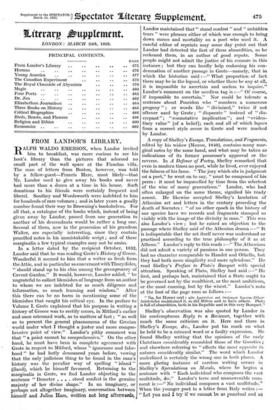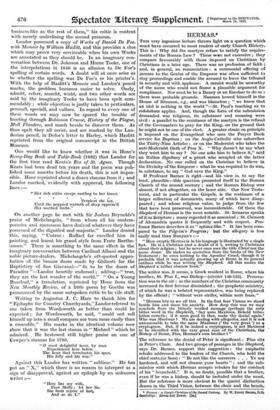FROM LANDOR'S LIBRARY.
ALPH WALDO EMERSON, when Landor invited IA him to breakfast, was more curious to see his host's library than the pictures that adorned no small part of the wall space at the Fiesolan villa. The man of letters from Boston, however, was told by a fellow-guest—Francis Hare, most likely—that Mr. Landor used to give away his books and never had more than a dozen at a time in his house. Such donations to his friends were certainly frequent and liberal. Southey and Wordsworth were indebted to him for hundreds of rare volumes ; and in later years a goodly number found their way to Browning's bookshelves. For all that, a catalogue of the books which, instead of being given away by Landor, passed from one generation to another of his descendants would be .rather a long one. Several of them, now in the possession of his grandson Walter, are especially interesting, since they contain pencilled notes in his unmistakable script ; and of these marginalia a few typical examples may not be amiss.
In a letter dated by the recipient October, 1852, Landor said that he was reading Grote's History of Greece. Wonderful it seemed to him that a writer so fresh from the Attic, and in particular so conversant with Thucydides, " should stand up to his chin among the greengrocery of Covent Garden." It would, however, Landor added, " be ungrateful to collect blemishes of language from an.author to whom we are indebted for so much diligence and information, so much learning and wisdom." After this there can be no harm in mentioning some of the blemishes that caught his critical eye. In the preface to Volume I. Grote explained that his purpose in writing a history of Greece was to rectify errors, in Mitford's earlier and once esteemed work, as to matters of fact ; " as well as to present the general phaenomena of the Grecian world under what I thought a juster and more compre- hensive point of view." , Landor's pithy comment was that " a point cannot be comprehensive." On the other hand, he must have been in complete agreement with Grote in respect to Mitford, whose " ignorance and false- hood " he had hotly denounced years before, vowing that the only judicious thing to be found in the man's history was the peculiar way of spelling " island " (Hand), which he himself favoured. Returning to the marginalia in Grote, we find Landor objecting to the sentence " Demeter . . . . stood confest in the genuine majesty of her divine shape." In an imaginary, or perhaps not altogether imaginary, conversation between himself and. Julius Hare. written not long afterwards, Landor maintained that" stand confest " and " unbidden tears " were phrases either of which was enough to bring down curses and mortality on a poet who used it. A careful editor of reprints may some day point out that Landor had detected the first of these absurdities, as he reckoned them, in an author of good repute. Some people might not admit the justice of his censure in this instance ; but they can hardly help endorsing his con- demnation of another passage in Grote—namely, that in which the historian said :—" What proportion of fact there may be in the legend, or whether there be any at all, it is impossible to ascertain and useless to inquire." Landor's comment on the needless tag is :—" Of course, if impossible to ascertain." Nor could he tolerate a sentence about Poseidon who " numbers a numerous progeny " ; or words like " divinized," twice if not oftener used by Grote ; " disparate " instead of " dis- crepant" ; " connotative implication" ; and " eviden- tiary value" [of a belief]; each and all of which lapses from a correct style occur in Grote and were marked by Landor.
A copy of Shelley's Essays, Translations, and Fragments, edited by his widow (Moxon, 1840), contains many mar- ginal notes by the same hand, and what may be taken as indications of its former possessor's approval or the reverse. In A Defence of Poetry, Shelley remarked that even in modern times no poet, while he lived, ever enjoyed the fulness of his fame. " The jury which sits in judgment on a poet," he went on to say, " must be composed Of his peers : it must be impanelled by time from the selectest of the wise of many generations." Landor, who had often enlarged on the same theme, signified his ready assent. He likewise accepted Shelley's laudation of Athenian art and letters in the century preceding the death of Socrates : " of no other epoch in the history of our species have we records and fragments stamped so visibly with the image of the divinity in man." - This was also Landor's view ; but he raised an objection to the passage where Shelley said of the Athenian drama :—" It is indisputable that the art itself never was understood or practised according to the true philosophy of it as at Athens." Landor's reply to this reads :—" The Athenians did not admit a variety of passions in one person. They had no character comparable to Hamlet and Othello, but they had both more simplicity and more splendour." He read Shelley's Preface to Plato's Banquet with special attention. Speaking of Plato, Shelley had said :—" He first, and perhaps last, maintained that a State ought to be governed not by the wealthiest, or the most ambitious, or the most cunning, but by the wisest." Landor's note at the foot of the page runs as follows :- " Na, for Homer said : dev dptirreanv snt inreipoxov IiiFevat eiN.Xwv- Aristoteles maintained it, so did Milton and so have others. Plato is full of absurdities, both in his Republic and in this very Banquet.".
Shelley's observation was also quoted by Landor in his contemptuous Reply to a Reviewer, together with much the same criticism on it. Here and there in Shelley's Essays, &c., Landor put his mark on what he held to be a misused word or a faulty expression. He found Shelley writing that the opinions of the early Christians considerably resembled those of the Gnostics ; and elsewhere referring to " effects the most opposite in natures considerably similar." The word which Landor underlined is certainly the wrong one in both places. A more glaring instance of careless writing occurs in Shelley's Speculations on Morals, where he begins a sentence with " Each individual who composes the vast multitude, &c." Landor's terse and unanswerable com- ment is :—" No individual composes a vast multitude.'; When the younger poet in a letter from Italy writes :--- " Let you and I try if we cannot bb as punctual and as business-like as the rest of them," his critic is content with merely underlining the second pronoun.
Landor possessed a copy of Works of Daniel De Foe, with Memoir by William Hazlitt, and this provides a clue which may prove very serviceable when his own Works are annotated as they should be. In an imaginary con- versation between Dr. Johnson and Home Tooke, one of the interpolations in 1846 is an allusion to De Foe's spelling of certain words. A doubt will at once arise as to whether the spelling was De Foe's or his printer's. With the help of Hazlitt's Memoir and Landor's pencil marks, the problem becomes easier to solve. Onely, admitt, referr, seareht, wisht, and two other words are said' by the imaginary Tooke to have been spelt com- mendably ; while objection is justly taken to perticulars, perusal], special', and valluei. In regard to every one of these words we may now be spared the trouble of hunting through Robinson Crusoe, History of the Plague, Moll Flanders, and much beside to discover them. As thus spelt they all occur, and are marked by the Lan- dorian pencil, in Defoe's letter to Harley, which Hazlitt reprinted from the original manuscript in the British Museum.
One would like to know whether it was in Hone's Every-Day Book and Table-Book (1832) that Landor for the first time read Keats's Eve of St. Agnes. Though Keats had been dead ten years and the poem was pub- lished, some months before his death, this is not impos- sible. Hone reprinted about a dozen stanzas from it ; and Landor marked, evidently with approval, the following lines :—
" Her rich attire creeps rustling to her knees.
• • • • Perplext she lay, Until the poppied warmth of sleep oppress'd Her soothed limbs."
On another page he met with Sir Joshua Reynolds's praise of Michelangelo, " from whom all his contem- poraries and successors have derived whatever they have possessed of the dignified and majestic." Landor denied this, saying, " Untrue : Raffael far excelled him in painting, and learnt his grand style from Frate Bartho- lomeo." There is something to the same effect in the imaginary conversation between Cardinal Albani and the noble picture-dealers. Michelangelo's oft-quoted appro- bation of the bronze doors made by Ghiberti for the Baptistery of San Giovanni—" fit to be the doors of Paradise "—Landor heartily endorsed ; adding—" true, they are the last wonder of the world." " On a Young Rosebud," a translation, reprinted by Hone from the New Monthly Review, of a little poem by Goethe was pronounced by the same outspoken critic to be vile stuff.
Writing to Augustus J. C. Hare to thank him for "Epitaphs for Country Churchyards,",Landor referred to one taken from Wordsworth as better than could be expected ; for Wordsworth, he said, " could not roll himself up into a small compass nor turn more easily than a crocodile." His marks in the identical volume now show that it was the last stanza in " Michael " which he admired. He bestowed still higher praise on one of Cowper's stanzas for 1789.
" 0 most delightful hour, by man Experienced here below.
The hour that terminates his span, His folly and his woe."
Against this Landor has written " sublime." He has put an " X," which there is no reason to interpret as a sign of disapproval, against an epitaph by an unknown Writer ;—
" Here lies my wife, Poor Molly.; let her lice She finds repose at last, And so do L"



































































 Previous page
Previous page